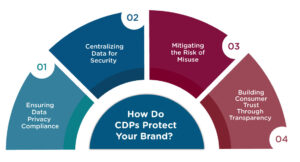When you are looking to buy something online, you get very relevant ads on social platforms like Instagram, Facebook etc. Have you ever wondered why?
For example, if you ever went online to buy a phone, you might have gone through a search process that possibly looks like this:
- Google searched “best phones in 2024”
- Checked out a variety of websites
- Watch a couple of videos that (most probably) are on YouTube just to figure out what phone you like specifications, technical details.
- Checked out some retailers that deal in phones as well
When you finally decided to buy a phone, you worked over the best place to purchase it and also browsed some other places to compare the prices, delivery time, returns and more.
While you’re going through this process, you might have interacted directly or indirectly with the company you decided to buy the phone from. This can be done through visiting their websites, chatting live on their page, ads and more.
With each interaction you had with that company you might have felt that the experience is getting tailor made for you or personalized. When you saw those ads, you might have felt “these are exactly the things I was searching for!” The website may have made very fine changes to make it feel like it was personalized to you.
How was the company able to do all this?
It is plausible the company was using Customer Data Platform (CDP) to personalize their marketing to you.
What Are Customer Data Platforms (CDPs)?
A Customer Data Platform (CDP) is software that brings together, aggregates and synchronizes all client data from multiple sources to create a real single client portrait. Takes data from websites, apps and email campaigns all the way to social media and CRMs in order to deliver insights that can be actually acted upon.
CDPs, in contrast to traditional data management systems, have a single place of centralized real-time, structured and readily- beings CDPs, in contrast to traditional data management systems, have a single place of centralized real-time, structured, and readily-being data about customers. This enables marketers to easily target audiences, personalize the interaction, and measure campaign success.
Customer Data Platforms have emerged as Customer Data Platforms (CDPs) because they solve the key problem in data-driven marketing, which is: bringing together fragmented customer data in a privacy-conform way (CCPA, GDPR) cultivated.
How Do CDPs Protect Your Brand?
The fact that brands are starting to rely on data to do personalized marketing and customer experience — makes the importance of data security and privacy to be next to none. Here’s how CDPs act as shield for brand:
1. Ensuring Data Privacy Compliance
GDPR, CCPA Modern CDPs are designed to conform to the global privacy regulations of today. It helps brands to control customer consent, data ethics and prevent costly compliance penalties.
2. Centralizing Data for Security
Having disjointed customer data across different systems multiplies the odds that access will be compromised. CDPs limit vulnerabilities and create additional security layers by housing data in a centralized manner, within secure environments.
3. Mitigating the Risk of Misuse
CDPs give you visibility into who actually has access to customer data (meaning less chance of internal misuse, less chances of random people accessing) This amount of accountability creates customer confidence and keeps brand true.
4. Building Consumer Trust Through Transparency
A true CDP ensures that brands can demonstrate how data is collected and stored as well as used with customers. Trust is built through transparency, which results in you better brand reputation and saves your company from remorse or suits.
Advantages of Using Customer Data Platforms
Customer Data Platforms are an adoption that provides multiple key advantages to a brand in the market:
1. Centralized Customer Data Insights
CDPs bring together data from different sources into the cohesive customer profile that enable brands to start seeing and understanding what is happening with their customer bases.
2. Tailored Customer Experiences
Using unified CDPs, marketers create highly personalized campaigns across the individual person rather than calling all of the customers. Personalized experiences usually translate into higher engagement and loyalty.
3. Improved Marketing Efficiency
Now the marketing teams have access to accurate customer data, can deliver more focused campaigns that decrease wasted ad spending and increase overall ROI.
4. Real-Time Insights
CDPs Updates in real-time, so brands can make quick data driven decisions and act on customer needs in-the-moment.
5. Stronger Customer Relationships
By delivering tailored experiences and respecting privacy preferences, CDPs help brands build long-lasting, meaningful relationships with their customers.
Potential Threats of Using Customer Data Platforms
Benefits come in droves with CDPs, yet they come with inherent risks as well. Five CDP challenges that brands need to be aware of:
1. Customer Information Compromise
CDPs will not be immune to cyber-attacks. A breach of their systems could potentially leak personal customer data, resulting in a loss of reputation and money.
2. Challenging System Deployment
CDP implementation is a multi-faceted process, it demands huge time, money and resource commitment. Inadequate implementation can result in data silos and inaccuracies of data defeating the whole purpose.
3. Over-Reliance on Technology
Brands that rely solely on CDPs for decision-making might overlook the importance of human judgment and strategic planning. Technology should enhance, not replace, human insights.
4. Excessive Information Management
CDPs are great at collecting data, but too much of anything for some teams is just overwhelming. The data will not turn into actionable insights if it is not properly analyzed.
5. Customer Data Misuse Risks
Even with privacy-compliant CDPs, mishandling or misinterpreting data can lead to customer dissatisfaction or legal repercussions.
The Rise of Customer Data Platforms
Since data is leading to what the future of customers experience is, Customer Data Platforms will start to be used even more as a critical instrument in business strategizing. This is what to expect from CDPs in the future:
1. Intelligent Data-Driven Predictions
Future CDPs will leverage even more advanced AI and machine-learning to derive more sophisticated views on the behaviors of customers and will be even more precise in its forecasting of trends.
2. Stronger Security Protocols
In response to escalating cybersecurity threats, CDPs will be tightened up with improved encryption, biometric authentication and more advanced security methods.
3. Increased Focus on First-Party Data
Third-party cookies dying, brands will start to lean on CDPs more for the responsible and effective extraction and utilization of first party data.
4. Integration with Emerging Technologies
CDPs will increasingly integrate with IoT devices, voice assistants, and other emerging technologies to collect and process more nuanced customer data.
5. Customer-Centric Evolution
As customer expectations evolve, CDPs will adapt to provide brands with the tools needed to deliver even more personalized, meaningful experiences.
Are CDPs the Ultimate Shield for Your Brand?
Customer Data Platforms do serve an important protective function and set of customer benefits; however — they are not a silver bullet. They do their best when embedded in a robust data framework (with solid security, ethical data practices, and customer protection at the center)
Of course, investing in a CDP is a good thing for brands to unify data and improve dwell and grow trust. Ultimately, to help your business brand — you should also marry CDPs with a strong data governance roadmap and follow new tech/privacy laws.
CDPs are not just a wall—they are a strategic weapon to grow in the digital era. Through the use of their capability’s brands can not only protect themselves, but from the competitive edge in this more and more data driven world.
Also Read:
5 Ways AI Can Transform Your Social Media Strategy
The Emergence of Virtual Avatar: Key Advantages in Business, Tools, and More






